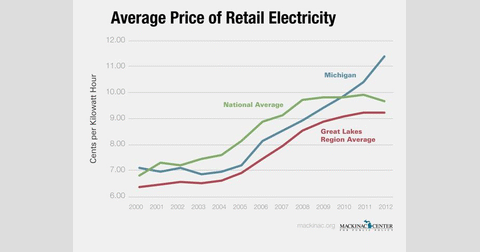Commentary
Analysis: Misleading Commercial on Electric Rates
Comparison to Texas invalid, dishonest

Source: U.S. Energy Information Administration
A new commercial is attempting to make Michigan residents fear electricity deregulation.
It claims that Texas "decided to experiment with deregulating their electricity," and subsequently, prices "shot through the roof" and "blackouts threatened communities." It then tells that a proposed bill in this state that would "deregulate Michigan's electricity."
Michiganders need not fear, however, for this commercial is charged with only half-truths.
For starters, state policymakers are not considering electricity deregulation. The cited legislation — Rep. Mike Shirkey's House Bill 5184 — merely lifts the cap on the portion of consumers who would be able to choose an alternative electricity provider (other than the one assigned to them by Michigan's current monopoly system). The electricity market in Michigan would remain just as regulated as it is now. The state would still control which utilities could operate and would continue to regulate rates, among other things.
The use of Texas as an example of failed deregulation due to its impact on prices in the Lone Star State is puzzling. As outlined in a recent report by the Michigan Public Service Commission, the average residential retail price of electricity in Michigan increased faster than Texas's over the last decade and remains significantly higher. Texas's rates were about eight cents per kilowatt hour in 2000 and about 11 cents in 2013. Michigan's rates were about 11 cents per kilowatt hour in 2000 and increased to almost 15 cents in 2013, the highest in the Midwest region and 11th highest in the nation.
If the deregulated Texas rates "shot through the roof," it might be said that Michigan's monopoly rates rocketed through the stratosphere.
By artificially blocking potential competitors from the electricity market, current Michigan law enriches the state's two largest utilities — Consumers Energy and DTE. It should come as no surprise that these electricity providers will fight to maintain their privileged status. But this debate should focus on what's best for consumers, not just providers.
And as Mackinac Center for Public Policy Scholar Ted Bolema recently argued, the facts are that consumers are best served when electric utilities have to compete for their business, just like consumers are better off now that they have a wide selection of telephones and television providers.
|

Analysis: Misleading Commercial on Electric Rates
Comparison to Texas invalid, dishonest
A new commercial is attempting to make Michigan residents fear electricity deregulation.
It claims that Texas "decided to experiment with deregulating their electricity," and subsequently, prices "shot through the roof" and "blackouts threatened communities." It then tells that a proposed bill in this state that would "deregulate Michigan's electricity."
Michiganders need not fear, however, for this commercial is charged with only half-truths.
For starters, state policymakers are not considering electricity deregulation. The cited legislation — Rep. Mike Shirkey's House Bill 5184 — merely lifts the cap on the portion of consumers who would be able to choose an alternative electricity provider (other than the one assigned to them by Michigan's current monopoly system). The electricity market in Michigan would remain just as regulated as it is now. The state would still control which utilities could operate and would continue to regulate rates, among other things.
The use of Texas as an example of failed deregulation due to its impact on prices in the Lone Star State is puzzling. As outlined in a recent report by the Michigan Public Service Commission, the average residential retail price of electricity in Michigan increased faster than Texas's over the last decade and remains significantly higher. Texas's rates were about eight cents per kilowatt hour in 2000 and about 11 cents in 2013. Michigan's rates were about 11 cents per kilowatt hour in 2000 and increased to almost 15 cents in 2013, the highest in the Midwest region and 11th highest in the nation.
If the deregulated Texas rates "shot through the roof," it might be said that Michigan's monopoly rates rocketed through the stratosphere.
By artificially blocking potential competitors from the electricity market, current Michigan law enriches the state's two largest utilities — Consumers Energy and DTE. It should come as no surprise that these electricity providers will fight to maintain their privileged status. But this debate should focus on what's best for consumers, not just providers.
And as Mackinac Center for Public Policy Scholar Ted Bolema recently argued, the facts are that consumers are best served when electric utilities have to compete for their business, just like consumers are better off now that they have a wide selection of telephones and television providers.
Michigan Capitol Confidential is the news source produced by the Mackinac Center for Public Policy. Michigan Capitol Confidential reports with a free-market news perspective.
More From CapCon